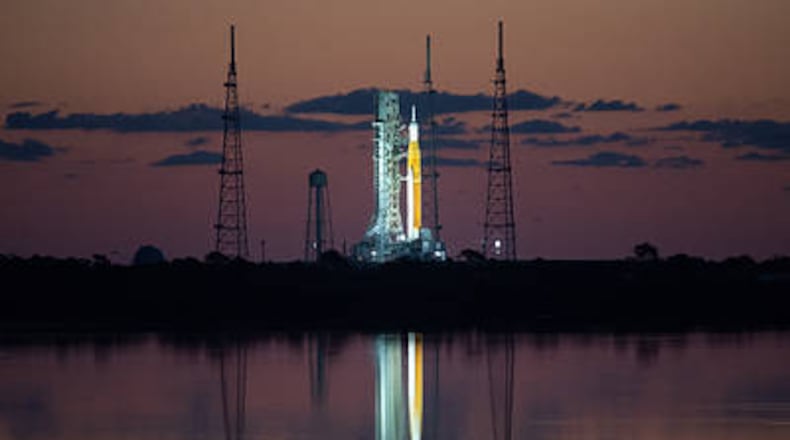NASA leaders like to talk numbers, and Melroy shared plenty of them.
Credit: (NASA/Bill Ingalls)
Credit: (NASA/Bill Ingalls)
Here are a few: There are 62 Ohio companies “providing critical support directly to Artemis,” NASA’s new moonshot, Melroy said.
Twenty-seven Ohio companies are supplying NASA’s ground systems exploration program, the ground equipment needed to launch the big moon rocket.
Two Ohio companies are supporting the human landing system to take people to the moon’s surface.
Thirteen Ohio companies are supplying NASA’s Orion spacecraft, the craft that will carry crew through space, and the first craft since Apollo that can protect astronauts from the deep space environment through re-entry into Earth’s atmosphere.
Melroy delivered a list of NASA endeavors that Ohio companies are supporting at the moment, saying: “Ohio is critical to everything I just mentioned, critical to NASA and in fact is in our top 10 states in terms of the aerospace investments that we make and the work that we have.”
- The first private astronaut mission to the International Space Station.
- The growth of commercial missions to space, which Melroy called the “real change” to space activity over the last decade, with private companies delivering both people and payloads to space.
- In aeronautics, Melroy said “the U.S. is back in the X-plane business,” a reference to the experimental X-59 aircraft, which Lockheed Martin is building for NASA. One objective with the plane is to demonstrate that supersonic travel can happen without the loud booms heard on the ground.
- The launching of a new science payload somewhere “every few months.”
- The first images from the James Webb telescope are expected “in less than a month.”
- “And of course, Artemis.”
Wright-Patterson Air Force Base has a role, too.
Doug Wheelock, a retired Army colonel and NASA astronaut, told the forum that future astronauts may find themselves training on Air Force Research Laboratory “disorientation” equipment. AFRL is based at Wright-Patterson.
Zachary Wilson, the public affairs officer for the Naval Research Unit at Wright-Patterson near the 711th Human Performance Wing, confirmed that the unit has helped prepare and train astronauts. He said the Air Force will have more to say on that work in the future.
Artemis is getting closer for a launch to the moon, preparing to return to a Florida launch pad for a second “wet dress rehearsal” with a space rocket, or a test of a fully fueled rocket.
“And of course, once we’ve completed that, we’ll be off to the moon on our uncrewed test flight later this year,” Melroy said.
The Artemis timeline has shifted in recent weeks. Now, the plan is to launch Artemis I — an uncrewed mission to the moon and back — this summer, NASA Glenn public affairs officer Jimi Russell told the Dayton Daily News.
NASA must conduct the second wet dress rehearsal in June before it can set an official launch date, but the intent is to launch as soon as possible this summer, Russell said.
Following Artemis I, NASA’s plan is to launch Artemis II, a crewed flight, around the moon and back, in 2024.
That will be followed by the hoped-for moon landing in early 2025 with Artemis III — America’s first since December 1972.
A recent NASA economic impact study showed a fiscal year impact of $2.3 billion to Ohio’s economy from NASA’s work, with $300 million impact of the agency’s “moon-to-Mars” efforts, Melroy said.
NASA Glenn works with Cleveland State University on an impact study, with the last full study showing NASA Glenn having a $1.8 billion impact on Ohio, generating about 9,000 jobs, in turn generating $155 million in local, state and federal taxes.
About the Author



